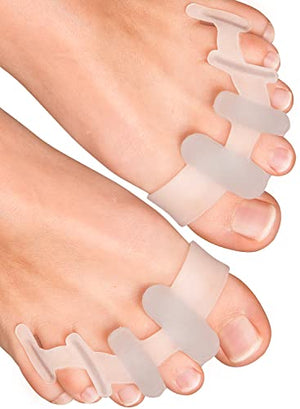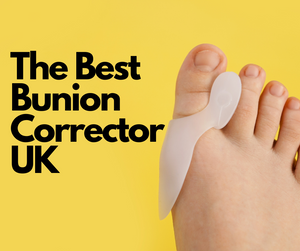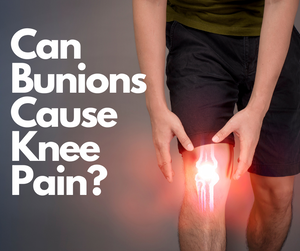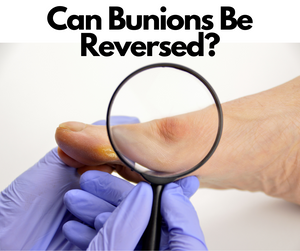Bunion corrector: Do They Work?

So ladies, lets talk about bunions. You know, those bony bumps that form on the side of your big toe? Or maybe you have one and don’t even know it yet. About 23% of women have bunions, and while they may be unsightly, for most people they are just a cosmetic concern. But for some, bunions can be painful. Have you ever worn those pair of new heels only to find you were unable to keep them on for the whole of your evening? Or have you ever tried to break in a new pair of shoes, only to find that they just don’t fit right no matter how many Band-Aids you put on your bunion? I remember thinking as I was getting older that they were just a normal part of feet until I saw some girlfriends and was in shock. I had no idea that was something that could be helped.
There are a few things that can cause bunions. Genetics plays a role (thanks mum and dad), as well as the type of shoes you wear. If you’ve ever seen an older woman with her feet turned out and her toes pointing in, chances are she has bunions. That’s because as we age, our ligaments and tendons stretch out and our bones soften, which can lead to the deformity. Wearing shoes that are too tight or have high heels can also cause bunions or make them worse.
So what’s the solution? Surgery is an option for some people, but it’s not always necessary. If you have bunions and they’re not causing you pain, then you can probably just leave them be. But if they are painful, there are a few things you can do to help relieve the discomfort. You can start by switching to shoes that have a wide toe box and low heels. This will take the pressure off your bunion. You can also try bunion pads or toe spacers to help cushion the bunion and keep it from rubbing against your shoe. And lastly, you can try stretching exercises to help keep the muscles and tendons around your bunion flexible.
If you’ve been dealing with bunions for a while, you know that they can be painful and frustrating. But there are things you can do to help ease the discomfort. So don’t suffer in silence, talk to your doctor about your options and find a bunion solution that works for you.
One such treatment is bunion correctors or bunion splints. These devices are meant to be worn at night while you sleep in order to help realign the bones in your foot and reduce the pain associated with bunions. But do bunion correctors really work?
There are a lot of bunion correctors on the market these days. Do they work? The answer to that question is not so simple. In this blog post, we will take a look at bunion correctors and whether or not they actually work. We will also discuss the different types of bunion correctors available and how to choose the right one for you. So, if you are wondering whether or not bunion correctors work, keep reading!
Can you straighten a bunion without surgery?
The short answer is: maybe. If you have a mild bunion, it is possible that a bunion corrector could help to improve the alignment of your big toe. However, if you have a more severe bunion, chances are that a bunion corrector will not be enough to straighten out your big toe. In this case, you would likely need to see a doctor for bunion surgery.
There are different types of bunion correctors available on the market. Some bunion correctors are designed to be worn during the day, while others are designed to be worn at night. There are also bunion correctors that can be worn both during the day and at night. The type of bunion corrector you choose will likely depend on your personal preferences and needs.
When choosing a bunion corrector, it is important to make sure that you choose one that fits well. If a bunion corrector is too tight, it could actually make your bunion worse. On the other hand, if a bunion corrector is too loose, it will likely not be effective. It is also important to choose a bunion corrector that is comfortable to wear. You should avoid any bunion correctors that are painful or uncomfortable to wear.
If you are considering wearing a bunion corrector, it is important to talk to your doctor first. Your doctor can help you determine whether or not a bunion corrector is right for you and can also recommend the best type of bunion corrector for your needs.
There are two main types of bunion correctors: splints and shoes. Splints are typically made of plastic or metal and are designed to be worn at night. Shoes, on the other hand, can be worn during the day and are usually made with a bunion pad built into them. So, which type of bunion corrector is right for you?
There is no one-size-fits-all answer to this question. It really depends on your individual situation. If you have a mild bunion, a splint may be all you need to correct the problem. However, if you have a more severe bunion, you may need to wear a shoe with a bunion pad during the day and a splint at night.
There is no guarantee that bunion correctors will work for everyone. However, many people find that they help to reduce pain and improve the appearance of their bunions. If you are considering purchasing a bunion corrector, be sure to do your research and choose the one that is right for you.
How long does it take for bunion correctors to work?
There is no definitive answer to this question. It depends on the severity of your bunion and how diligent you are about wearing the corrector. Some people see results within a few weeks, while others may take longer. If you don't see any improvement after several months, it is unlikely that the bunion corrector will be effective.
Can bunion correctors make bunions worse?
If bunion correctors are not fitted properly, they can actually make bunions worse. It is important to make sure that you choose a bunion corrector that fits well and is comfortable to wear. If you have any concerns, be sure to talk to your doctor before purchasing a bunion corrector.
Bunion correctors can be a helpful tool in the treatment of bunions. However, they are not right for everyone. If you are considering purchasing a bunion corrector, be sure to do your research and talk to your doctor to see if one is right for you.
Do you have a bunion? Have you tried wearing a bunion corrector? Let us know in the comments below!




